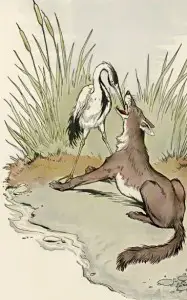The Wolf and the Crane (from the Fables of Aesop)

Ինչ որ ընես ապերախտին,
Բան չերեւնար իր ծակ աչքին։
Գայլը երբեմն ոչխար մը
Առակս կը խրատէ անզգամ մարդէն հեռու կենալ, եւ չարութեանը օգնութիւն չընել. վասն զի ինչ որ ընես աչքին չերեւնար. ու վերջը շնորհակալ ըլլալու տեղը քեզմէ շնորհակալութիւն կ’ուզէ։
A Wolf, after devouring his prey, happened to have a bone stick in his throat, which gave him so much pain, that he went howling up and down, and importuning every creature he met to lend him a kind hand, in order to his relief; nay, he promised a reasonable reward to any one that should undertake the operation with success. At last the Crane, tempted with the lucre of the reward, and having first procured him to confirm his promise with an oath, undertook the business, and ventured his long neck into the rapacious felon's throat. In short, he plucked out the bone, and expected the promised gratuity. When the Wolf, turning his eyes disdainfully towards him, said,—'I did not think you had been so unconscionable; I had your head in my mouth, and could have bit it off whenever I pleased, but suffered you to take it away without any damage, and yet you are not contented.'
There is a sort of people in the world, to whom a man may be in the wrong for doing services, upon a double score: first, because they never deserved to have a good office done them; and, secondly, because, when once engaged, it is so hard a matter to get well rid of their acquaintance. This fable is not an example of ingratitude, as at first sight it seems to be, and as some of the mythologists have understood it; to make it a parallel in that case, the Crane ought to have been under some difficulties in his turn, and the Wolf have refused to assist him when it was in his power. The whole stress of it lies in this: that we ought to consider what kind of people they are to whom we are desired to do good offices, before we do them; for he that grants a favour, or even confides in a person of no honour, instead of finding his account in it, comes off well if he is no sufferer.


Comments
Post a Comment